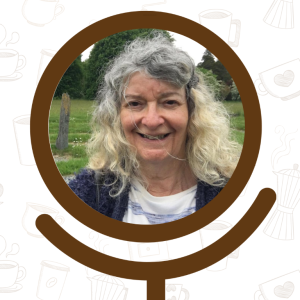Fueling Creativity in Education
Episodes

Friday Dec 17, 2021
Discussing Excellence Gaps and Creativity with Dr. Jonathan Plucker - Part 2
Friday Dec 17, 2021
Friday Dec 17, 2021
It’s easy to have a negative view of testing, but testing does have value in terms of content knowledge acquisition. In part two of this two-part interview, Dr. Cyndi Burnett and Dr. Matthew Worwood speak with researcher and creativity expert, Dr. Jonathan Plucker, about the relationship between gifted education and creativity. Jonathan also speaks on why he believes every school should have a Chief Creativity Officer and what that would look like.
Tune in to learn Jonathan’s approach to testing students, assessing for gifted education programs, and how to identify students who are talented or gifted. He sheds light on why it’s a huge mistake to drive advanced learning and creativity out of our schools. Plus, he shares his thoughts on why educators should be focusing on students with true potential who are underperforming and turning that potential into advanced performance.
“If a student’s performing at advanced levels, I encourage people not to overthink that. Just accept it. Great, they’re working at advanced levels. That’s the goal. How much further can I push this student?... But we have so many students who are not performing at those advanced levels who have the potential to get there and that’s what I’m really concerned about is we tend to look right past those students.” - Dr. Jonathan Plucker
Jonathan’s Tips for Teachers, Administrators, and Parents:
The best way to use teacher involvement is to focus on what they are trained to do: to help students, especially those who aren’t being noticed. If you’re going to be identifying for a talent, don’t use teachers as gatekeepers. Collect all your data and then use teachers as the safety net to catch those whom the administrators missed.
Modeling is incredibly important for creativity. If you run into a problem, have your students/children work with you to solve it.
Creative Articulation: Professional, long-term creators are very good at convincing people that their work is creative. They are also masterful at incorporating feedback and using it to improve their work. Help your students/children learn how to share their creativity and persuade others that their perspective is valuable… at ALL ages.
About Dr. Jonathan Plucker:
Jonathan Plucker is a prominent education policy and talent development scholar, and the inaugural Julian C. Stanley Professor of Talent Development at Johns Hopkins University. He holds a joint appointment at the Center for Talented Youth and School of Education.
His work focuses on education policy and talent development and has been supported by over $40 million in external grants and contracts. Jonathan has published over 300 articles, chapters, and reports. He recently became editor for the Psychological Perspectives on Contemporary Educational Issues series at IAP. His work defining and studying excellence gaps (http://cepa.uconn.edu/mindthegap) is part of a larger effort to reorient policymakers’ and educators’ thinking about how best to promote success and high achievement for all children.
Visit Jonathan’s website
Follow him on Twitter
Book & Publications by Dr. Jonathan Plucker
Resources Mentioned:
Book & Publications by Dr. Jonathan PluckerListen to the episode with Scott Barry Kaufman
Listen to the episode with Sally Reis
Eager to bring more creativity into your home or classroom?
Access various creativity resources and tools & listen to more episodes of The Fueling Creativity in Education Podcast by visiting www.CreativityandEducation.com.
What to learn more about Design Thinking in Education?
Do you want to build a sustained culture of innovation and creativity at your school? Visit WorwoodClassroom.com to learn how Design Thinking can promote teacher creativity and support professional growth in the classroom.
Subscribe to our monthly newsletter!
You can also find The Fueling Creativity Podcast on Apple Podcasts, Spotify, Audible, and PodBean! Make sure to rate, review, and share the podcast if you enjoy it!

Friday Dec 17, 2021
Discussing Excellence Gaps and Creativity with Dr. Jonathan Plucker - Part 1
Friday Dec 17, 2021
Friday Dec 17, 2021
Our last guest of the season features a double expresso with President of the National Association for Gifted and Talented, Dr. Jonathan Plucker. In part one of this two-part interview, Jonathan shares his thoughts on problems with achievement gaps and excellence gaps in education.
“I’m actually fully convinced that in the next 10-15 years, if we prioritize this, we can actually go a long way to solving this problem… and I could not have said that five or six years ago.”
- Dr. Jonathan Plucker
Listen in to gain insight into the connection between academic excellence and creativity later in life, and why there’s never a blank canvas to work with when being creative. Jonathan also shares his candid thoughts on creativity in imaginative play, as well as how we can diminish the harmful impact of poverty on children’s ability to develop imagination.
“The more that students learn, the more information, the more ‘stuff’… that they have at their mental fingertips, the better off they will be as they try to be creative, especially as they move into their careers later in life.”
- Dr. Jonathan Plucker
About Dr. Jonathan Plucker:
Jonathan Plucker is a prominent education policy and talent development scholar, and the inaugural Julian C. Stanley Professor of Talent Development at Johns Hopkins University. He holds a joint appointment at the Center for Talented Youth and School of Education.
His work focuses on education policy and talent development and has been supported by over $40 million in external grants and contracts. Jonathan has published over 300 articles, chapters, and reports. He recently became editor for the Psychological Perspectives on Contemporary Educational Issues series at IAP. His work defining and studying excellence gaps (http://cepa.uconn.edu/mindthegap) is part of a larger effort to reorient policymakers’ and educators’ thinking about how best to promote success and high achievement for all children.
Visit Jonathan’s website
Follow him on Twitter
Book & Publications by Dr. Jonathan Plucker
Resources Mentioned:
Book & Publications by Dr. Jonathan PluckerListen to the episode with Scott Barry Kaufman
Listen to the episode with Sally Reis
Eager to bring more creativity into your home or classroom?
Access various creativity resources and tools & listen to more episodes of The Fueling Creativity in Education Podcast by visiting www.CreativityandEducation.com.
What to learn more about Design Thinking in Education?
Do you want to build a sustained culture of innovation and creativity at your school? Visit WorwoodClassroom.com to learn how Design Thinking can promote teacher creativity and support professional growth in the classroom.
Subscribe to our monthly newsletter!
Follow Cyndi and Matt on Linkedin.
You can also find The Fueling Creativity Podcast on Apple Podcasts, Spotify, Audible, and PodBean! Make sure to rate, review, and share the podcast if you enjoy it!

Friday Aug 06, 2021
Friday Aug 06, 2021
Do you consistently reflect on how creative your teaching methods are? In this episode of Fueling Creativity, Dr. Cyndi Burnett and Dr. Matthew Worwood speak with author and retired teacher, Juliet Desailly. After becoming a lecturer at the Institute of Education, educating a new generation of primary teachers, it became obvious to her that the practice she had developed in the classroom was very much in line with the theories of creativity in education now being written about by academics.
As she reflects on her life as an elementary school teacher in the UK, Juliet summarizes the introduction of the National Standards during the 1980s and its eventual impact on student and teacher creativity in the classroom. She also speaks on how London’s education system compares to the rest of the UK, how to start reflecting upon the creativity in your own teaching methods, and what she would do to change how others view creativity in the classroom.
“One of the things I think is most illuminating is… that where there is difficulty, where there is challenge, it actually makes people be more creative in order to solve those problems. For me, in those inner-city schools, it was about engagement, it was about overcoming attitudes to being in school… every teacher in every classroom will find something.”
- Juliet Desailly
Juliet’s Tips for Teachers and Parents:
Really get to know your children. What engages them? What motivates them? What fascinates them? Remember, every child and group of children is slightly different.
Try hard to find contexts where the learning can be as authentic as possible. Search for real life or realistic situations and problems your kids can apply creativity to solve.
Find opportunities for cross-curricular learning wherever you can.
“Science, technology, all occupations, they all need creative people. Our countries all need creative people. The world needs them and yet still we are pushed back into thinking that ‘Oh, well creativity’s lovely but I need to get my test results up first’ or ‘Creativity’s great but we only have time to do it in a week before the holidays’.”
- Juliet Desailly
Resources Mentioned:
Creativity in the Primary Classroom by Juliet Desailly
Eager to bring more creativity into your home or classroom?
Access various creativity resources and tools & listen to more episodes of The Fueling Creativity in Education Podcast by visiting www.CreativityandEducation.com.
What to learn more about Design Thinking in Education?
Do you want to build a sustained culture of innovation and creativity at your school? Visit WorwoodClassroom.com to learn how Design Thinking can promote teacher creativity and support professional growth in the classroom.
Subscribe to our monthly newsletter!
You can also find The Fueling Creativity Podcast on Apple Podcasts, Spotify, Audible, and PodBean! Make sure to rate, review, and share the podcast if you enjoy it!
About Juliet Desailly:
Now retired, Juliet has worked in education for over 40 years. As a primary school teacher for over twenty of those years she worked to refine and adapt the curriculum to suit the needs of the children she taught in inner-city London.
She went on to become a lecturer at the Institute of Education, educating a new generation of primary teachers. It became obvious to her that the practice she had developed in the classroom was very much in line with the theories of creativity in education now being written about by academics. This allowed her to combine the two in really practical but theoretically based advice on practice in the classroom and in curriculum design. She worked as a consultant in schools on creativity and curriculum design and the importance of social and emotional aspects of learning.
She is the author of Creativity in the Primary Classroom and two children’s novels set in Ancient Egypt, with a companion volume of activities for teachers to use based on the books. She currently runs workshops for schools based on her children’s books and being an author.
Visit Juliet’s website